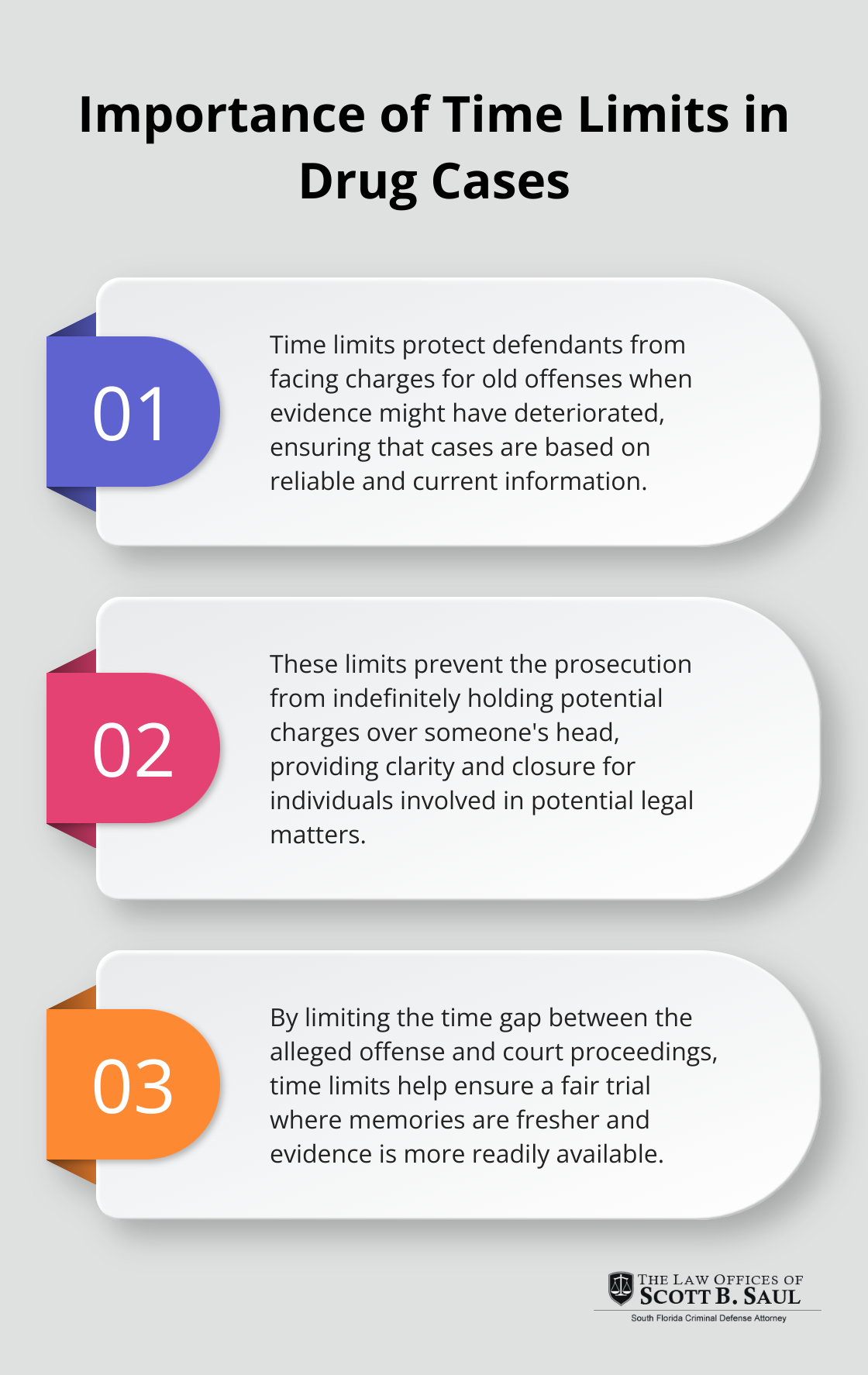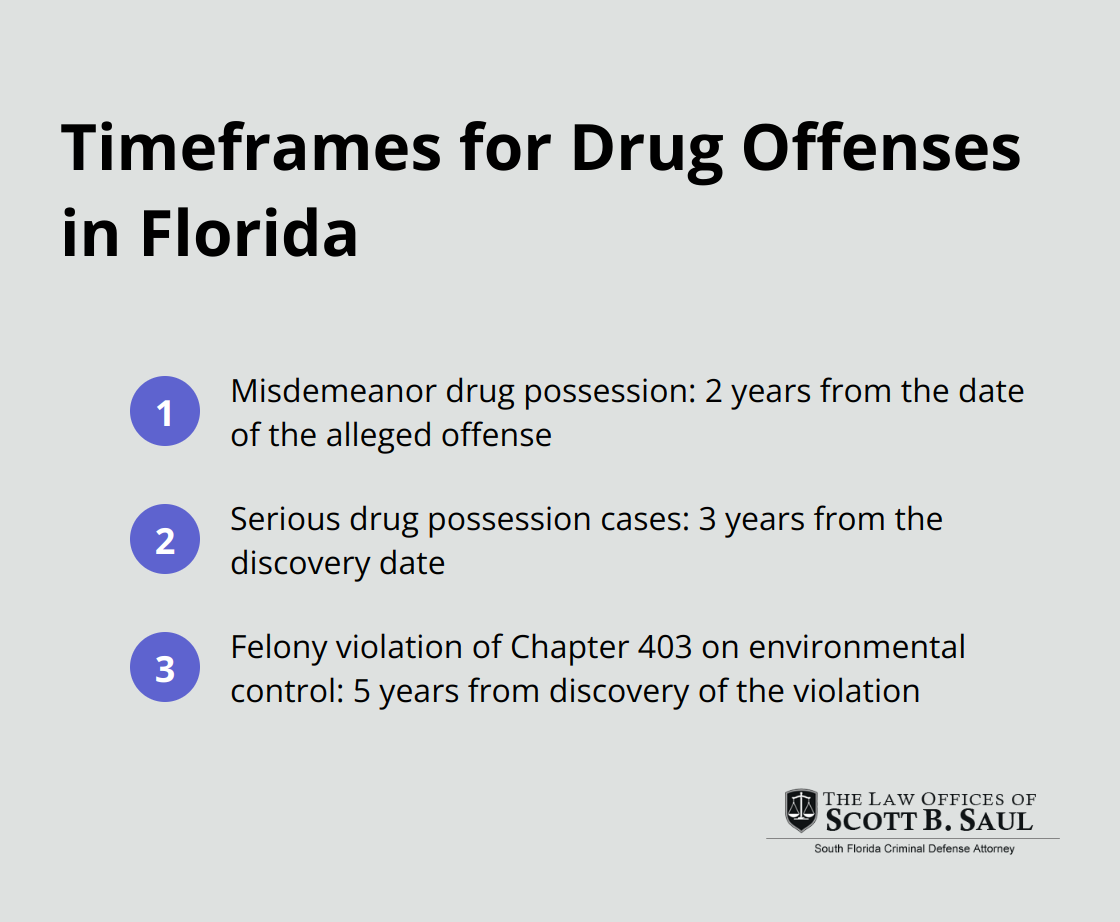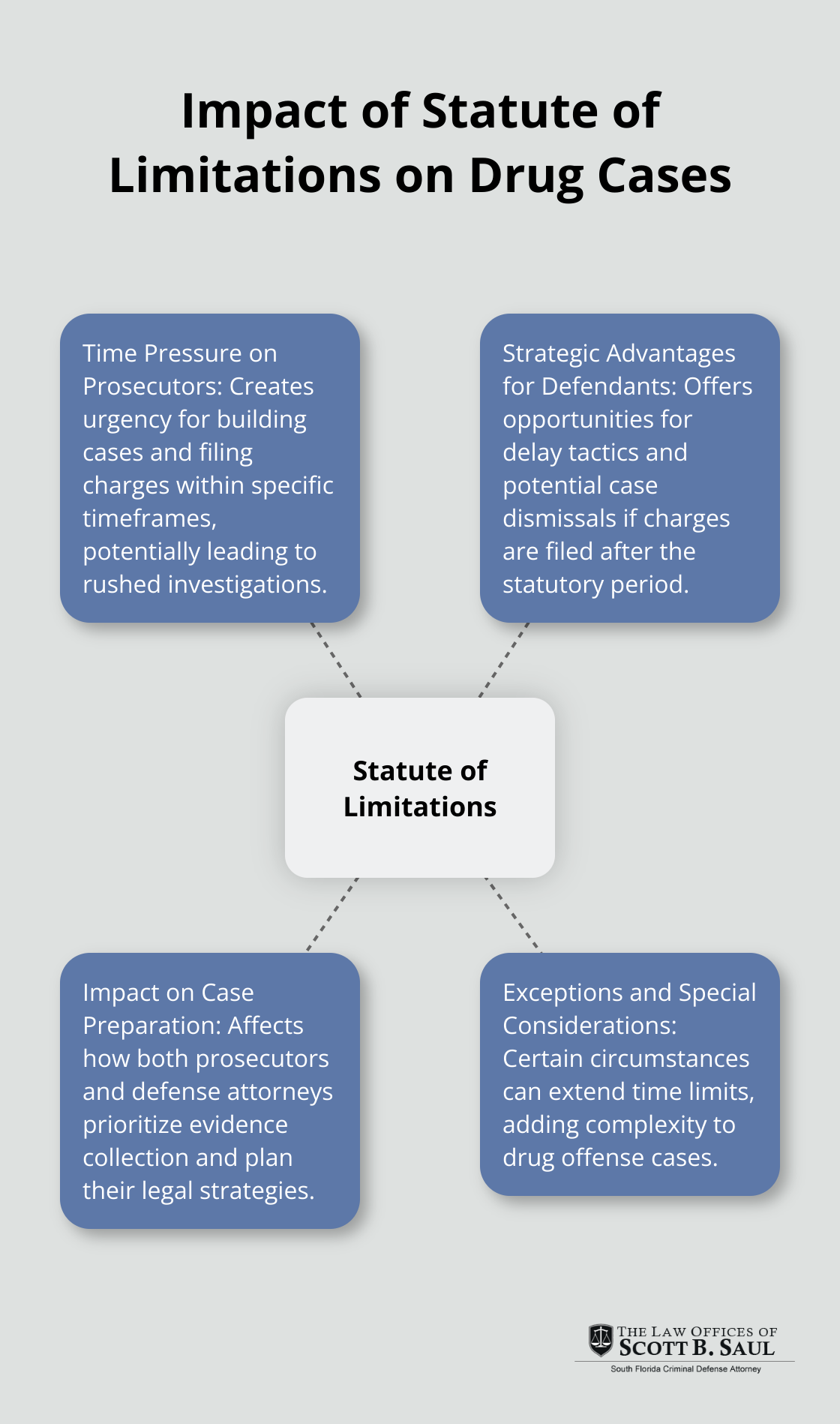How Long Is the Statute of Limitations for Drug Possession?
By : saulcrim | Category : Criminal Defense | Comments Off on How Long Is the Statute of Limitations for Drug Possession?
17th Jul 2025

Drug possession charges can have serious consequences, but there’s a time limit for prosecution. At Law Offices of Scott B. Saul, we often field questions about the statute of limitations for drug possession cases.
Understanding these time constraints is crucial for anyone facing drug-related charges. This blog post will explore the statute of limitations for drug possession, focusing on Florida law and its implications for defendants.
What Is the Statute of Limitations for Drug Possession?
The statute of limitations for drug possession sets legal time limits for prosecutors to file charges against individuals suspected of drug-related offenses. In Florida, these timeframes vary based on the severity of the alleged crime.
Time Limits for Different Drug Offenses
For misdemeanor drug possession (such as possession of 20 grams or less of cannabis), prosecutors have two years from the date of the alleged offense to file charges. For more serious drug possession cases, the statute of limitations is three years from the discovery date to file charges.
Importance of Time Limits in Drug Cases
These time limits serve multiple purposes in the criminal justice system:

Factors That Can Affect the Statute of Limitations
Certain circumstances can pause or extend the statute of limitations:
- If a suspect leaves Florida, the clock may stop running until their return.
- The discovery of new evidence (previously unavailable) might reset the timeline.
- Ongoing criminal enterprises can extend the limitation period.
Legal Implications and Defense Strategies
Understanding these nuances can significantly impact case outcomes. The complexity of drug laws and their associated time limits highlights the need for prompt legal consultation when facing potential drug charges.
Navigating the Legal Landscape
Drug possession cases often involve intricate legal details. Experienced attorneys can provide valuable insights into how the statute of limitations applies to specific situations. Their expertise can help defendants understand their rights and develop effective defense strategies within the given timeframes.
As we move forward, let’s examine how the statute of limitations specifically applies to drug possession cases in Florida, including any exceptions that might extend these time limits.
Florida’s Drug Possession Statute of Limitations
Florida’s statute of limitations for drug possession cases varies based on the offense severity. This chapter examines the timeframes for different drug offenses, distinguishes between misdemeanor and felony charges, and explores exceptions that can extend these limits.
Timeframes for Drug Offenses
Prosecutors in Florida have specific windows to file charges for drug possession:

These timeframes protect defendants from facing charges for old offenses when evidence might have deteriorated and prevent prosecutors from indefinitely holding potential charges over someone’s head.
Misdemeanor vs. Felony Drug Possession
The distinction between misdemeanor and felony drug possession affects the applicable statute of limitations:
- Misdemeanor charges, typically involving small amounts of marijuana, have a shorter window for prosecution. This reflects the less severe nature of the offense.
- Felony drug possession encompasses a wider range of substances and larger quantities. The extended statute of limitations allows law enforcement more time to build a case, reflecting the more serious nature of felony charges.
Exceptions and Extensions
While standard timeframes exist, certain circumstances can extend these limits:
Florida law also provides an extension of time for certain types of cases based on the age of the victim.
Understanding these nuances in Florida’s statute of limitations for drug possession is essential for anyone facing potential charges. The complexity of these laws underscores the importance of seeking experienced legal counsel promptly to protect your rights and explore all available defense strategies.
As we move forward, we’ll examine how these statutes of limitations impact drug possession cases and the legal strategies defendants can employ to navigate these time-sensitive matters.
How the Statute of Limitations Impacts Drug Cases

Time Pressure on Prosecutors
The statute of limitations creates urgency for prosecutors in drug possession cases. They must build a case and file charges within specific timeframes: four years for felonies of the first degree and varying periods for other felonies. This constraint can benefit defendants, as it may lead to rushed investigations or incomplete evidence gathering.
Prosecutors sometimes file charges hastily to beat the clock, potentially resulting in weaker cases.
Strategic Advantages for Defendants
The statute of limitations offers strategic opportunities for individuals facing potential drug charges. Delay tactics, when used skillfully, can sometimes exhaust the prosecution’s time limit. However, this approach requires careful navigation of legal complexities and should only be attempted with guidance from an experienced attorney.
Statute of Limitations as a Defense
The expiration of the statute of limitations can serve as a powerful defense strategy. Defendants can move for dismissal if charges are filed after the statutory period. This defense has proven effective in numerous cases across Florida.
A 2021 case in Miami-Dade County illustrates this point. Felony drug possession charges were dismissed when the defense successfully argued that the statute of limitations had expired. The prosecution had miscalculated the discovery date, highlighting the complexity and importance of these legal timelines.
Impact on Case Preparation
The statute of limitations affects how both prosecutors and defense attorneys prepare their cases. Prosecutors must prioritize evidence collection and witness interviews to meet the filing deadline. Defense attorneys, on the other hand, can use this time constraint to their advantage by carefully timing their actions and responses.
Exceptions and Special Considerations
While the statute of limitations provides a general framework, certain exceptions can extend these time limits. For instance, if a suspect leaves Florida, the clock may pause until their return. The discovery of new evidence (previously unavailable) might also reset the timeline. These exceptions add another layer of complexity to drug offenses and require careful consideration by both prosecution and defense teams.
Final Thoughts
The statute of limitations for drug possession cases in Florida sets critical time constraints for prosecutors. These limits range from two years for misdemeanors to three years for felonies, creating urgency in case preparation and prosecution. Defendants can use these time constraints to their advantage, potentially leading to case dismissals or weaker prosecutions.
Understanding these time limits is essential for anyone facing drug possession charges. Prompt action and expert legal guidance can significantly impact case outcomes. Experienced attorneys can provide valuable insights into how these limitations apply to specific situations.
At Law Offices of Scott B. Saul, we offer comprehensive legal support for drug possession cases (including statute of limitations considerations). Our team has extensive experience in navigating Florida’s complex drug laws. We provide personalized attention and aggressive representation to protect our clients’ rights throughout their legal proceedings.
Archives
- October 2025 (4)
- September 2025 (9)
- August 2025 (8)
- July 2025 (8)
- June 2025 (9)
- May 2025 (9)
- April 2025 (8)
- March 2025 (9)
- February 2025 (8)
- January 2025 (9)
- December 2024 (10)
- November 2024 (5)
- July 2024 (2)
- June 2024 (2)
- May 2024 (2)
- April 2024 (2)
- March 2024 (2)
- February 2024 (2)
- January 2024 (2)
- December 2023 (2)
- November 2023 (2)
- October 2023 (2)
- September 2023 (2)
- August 2023 (1)
- July 2023 (2)
- June 2023 (2)
- May 2023 (2)
- April 2023 (2)
- March 2023 (2)
- February 2023 (2)
- January 2023 (2)
- December 2022 (2)
- November 2022 (2)
- October 2022 (2)
- September 2022 (2)
- August 2022 (2)
- July 2022 (2)
- June 2022 (2)
- May 2022 (2)
- April 2022 (2)
- March 2022 (2)
- February 2022 (2)
- January 2022 (2)
- December 2021 (2)
- November 2021 (2)
- October 2021 (2)
- September 2021 (2)
- August 2021 (2)
- July 2021 (2)
- June 2021 (2)
- May 2021 (2)
- April 2021 (2)
- September 2020 (5)
- July 2020 (4)
- June 2020 (4)
- May 2020 (4)
- April 2020 (5)
- March 2020 (4)
- February 2020 (4)
- January 2020 (4)
- December 2019 (1)
- November 2019 (4)
- October 2019 (4)
- September 2019 (4)
- August 2019 (4)
- July 2019 (5)
- June 2019 (4)
- May 2019 (4)
- April 2019 (4)
- March 2019 (4)
- February 2019 (4)
- January 2019 (4)
- December 2018 (4)
- November 2018 (5)
- October 2018 (5)
- September 2018 (4)
- August 2018 (4)
- July 2018 (7)
- June 2018 (4)
- May 2018 (4)
- April 2018 (8)
- March 2018 (4)
- February 2018 (4)
- January 2018 (4)
- November 2017 (4)
- October 2017 (4)
- September 2017 (4)
- August 2017 (7)
- July 2017 (6)
- June 2017 (4)
- May 2017 (4)
- April 2017 (4)
- March 2017 (4)
- February 2017 (7)
- January 2017 (4)
- December 2016 (7)
- November 2016 (4)
- October 2016 (4)
- September 2016 (10)
- August 2016 (4)
- July 2016 (4)
- June 2016 (4)
- May 2016 (4)
- April 2016 (4)
- March 2016 (4)
- February 2016 (7)
- January 2016 (4)
- December 2015 (5)
- November 2015 (4)
- October 2015 (7)
- September 2015 (4)
- August 2015 (4)
- July 2015 (13)
- June 2015 (9)
- May 2015 (8)
- April 2015 (6)
- March 2015 (4)
- February 2015 (4)
- January 2015 (4)
- December 2014 (4)
- November 2014 (4)
- October 2014 (4)
- September 2014 (3)
Categories
- Adjudication (1)
- Bankruptcy (1)
- Burglary Crimes (3)
- calendar call (1)
- Car Accident (1)
- Criminal Defense (360)
- Cyber Crimes (7)
- DNA (1)
- Domestic Violence (9)
- Drug Crimes (5)
- DUI (12)
- Embezzlement (1)
- Environmental Crimes (4)
- Expungement Law (2)
- Federal Sentencing Law (3)
- Firearm (3)
- Forgery (4)
- General (82)
- Healthcare (3)
- Immigration (1)
- Indentity Theft (1)
- Insurance (5)
- judicial sounding (2)
- Juvenile Crimes (4)
- Manslaughter (4)
- Money Laundering (3)
- Organized Crime (1)
- Racketeering (1)
- Reckless Driving (3)
- RICO (3)
- Sealing and Expunging (2)
- Sex Offense (1)
- Shoplifting (1)
- Suspended Driver's License (1)
- Traffic (4)
- Trending Topics (1)
- White-collar Offenses (1)

